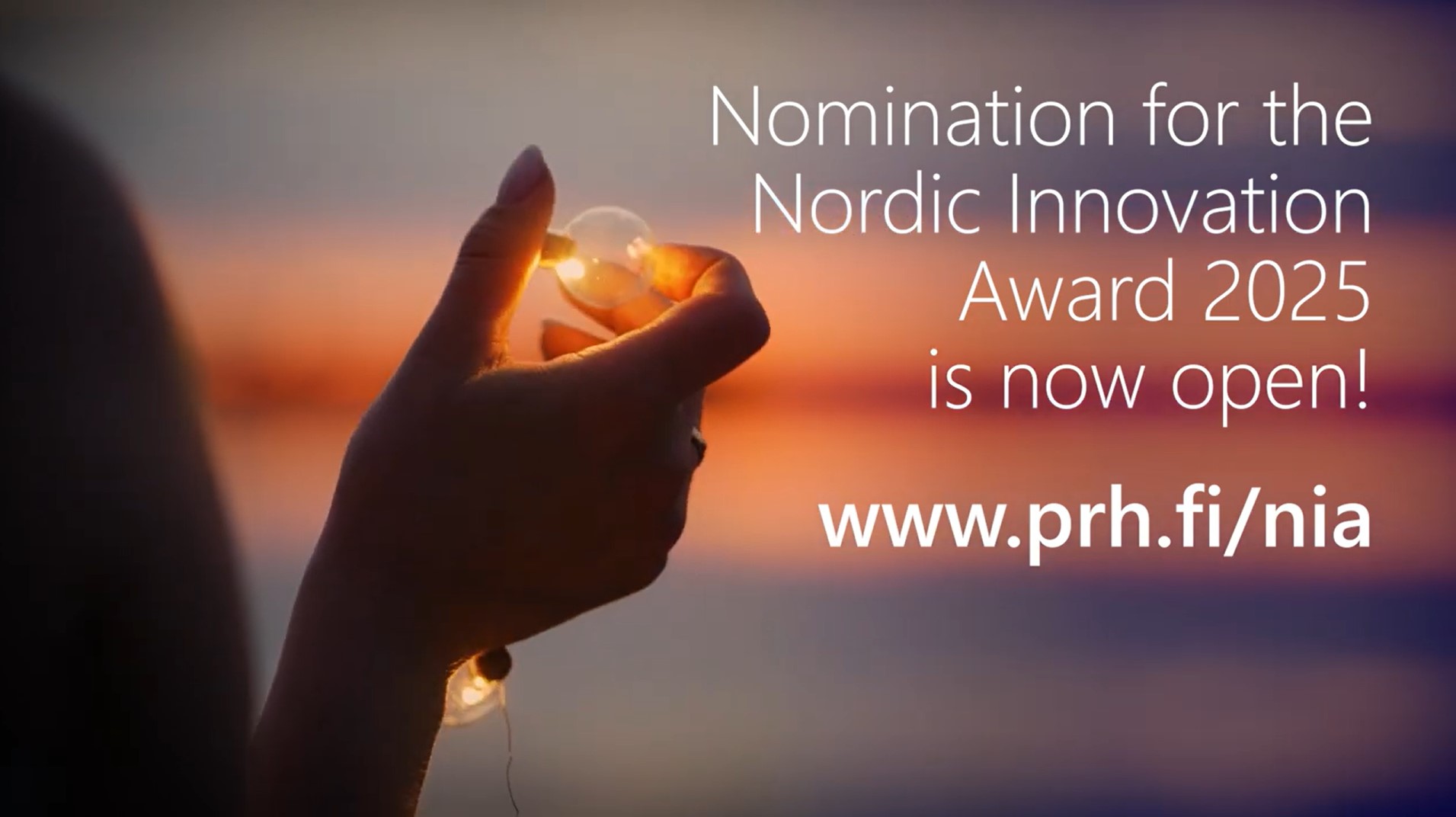Nordic Innovation Award 2025

The Nordic Innovation Award is a new Nordic innovation competition that rewards responsible and sustainable innovations (*). The competition is organised by the Nordic patent and trademark offices. In Finland, it is managed by the Finnish Patent and Registration Office.
All Finnish small and medium-sized enterprises operating in Finland with fewer than 250 employees can enter the competition.
One candidate will be selected from each of the five Nordic countries for the final, which will take place in Copenhagen, Denmark, on 10 April 2025. Additionally, the Finnish jury will award two honourable mentions.
Read more about the awarded Finnish companies in our news release.
Award criteria
- Level of innovation
The innovation must represent a new and original approach by utilising cutting-edge science or technology, unique methods, or creative problem-solving strategies. - Registered intellectual property rights (IPR)
The IPR related to the innovation must be protected by a registered trademark, design rights, and/or patent, or applications should be pending. The company should preferably have an active IPR strategy that supports its sustainability goals. - Responsibility and sustainability
The innovation should positively impact sustainability and promote one or more of the UN's Sustainable Development Goals (SDGs). - Economic viability and scalability
The innovation must be based on a viable business model and have the potential to expand to multiple geographical areas in the Nordics or globally. Solutions with concrete evidence of this will be assessed as more relevant. - Measurable results and evidence of success
The innovation should be presented with clear metrics or data demonstrating its effectiveness and impact. Solutions that have already shown success through pilot programmes, case studies, or proven methods will be evaluated as more relevant.
Factors for additional points:
- Nordic values: Proposals should reflect Nordic core values such as equality, transparency, community, and respect for the environment.
- Collaboration and cross-border potential: Companies that emphasise collaboration between different Nordic countries, organisations, or industries are highly valued, as they reflect the spirit of regional cooperation.
- Community engagement and social impact: Companies that involve local communities or stakeholders and emphasise inclusion and accessibility.
Competition period
The competition period is over. Competition was open from 3 January 2025 to 3 February 2025.
Participation in the competition
All Finnish small and medium-sized enterprises operating in Finland with fewer than 250 employees can participate in the competition. Participation is free of charge.
Competition jury
The Finnish jury consists of representatives from business and experts in innovation activities. The jury is made up of:
- Professor Peter Lund, Aalto University
- CEO Karri Leskinen, Boco IP (representing The Association of Finnish Patent Attorneys)
- CEO Jukka Leskelä, Finnish Energy
- CEO Juha Ylä-Autio, Excellence Finland
- Negotiating Officer Kirsti Vilén, Ministry of Economic Affairs and Employment (TEM)
- Leading Expert Minna Aalto-Setälä, The Finland Chamber of Commerce
- Senior Advisor Marko Kotonen, Business Finland
Additionally, Jorma Hanski, Anna Lauttamus-Kauppila as the chair of the jury, and Olli Ilmarinen as the secretary of the jury from the Finnish Patent and Registration Office are also part of the panel.
More information about the competition
For more information about the competition, please send an email to: viestinta@prh.fi
Responsible and sustainable innovation (*)
Definition of responsible and sustainable innovation
A responsible and sustainable innovation is a solution that meets the needs of society today without compromising the ability of future generations to meet their own needs. It combines economic, environmental, and social perspectives to create long-term value for industry and society.
Characteristics of responsible and sustainable innovation
- The innovation reduces resource consumption (e.g., energy, water, materials).
- The innovation minimises its environmental impacts (such as carbon dioxide emissions or waste).
- The innovation contributes to positive social development (e.g., by improving quality of life or community health).
- The innovation is economically viable, making the solution scalable and accessible for broader use.
Sustainable innovations should support the UN's Sustainable Development Goals (SDGs). At its core, sustainable innovation balances benefits with long-term impacts on the world, ensuring a positive contribution to society and the environment over time.

